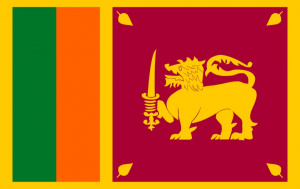Language/Sinhala/Culture/Festivals-and-Celebrations
| ◀️ Verbs and Tenses — Previous Lesson | Next Lesson — Sinhala Cuisine ▶️ |
Sinhala festivals and celebrations are an important part of Sri Lankan culture. They are celebrated with great enthusiasm and are an opportunity to gather with family, friends, and loved ones. In this lesson, we will explore some of the most popular and significant festivals and celebrations in Sinhala culture.
With the completion of this lesson, consider investigating these related pages: Traditional Arts and Crafts & Ancient Civilization of Sri Lanka.
Sinhala and Tamil New Year
The Sinhala and Tamil New Year, also known as Avurudu, is one of the biggest and most important festivals in Sri Lanka. It usually falls on the 13th or 14th of April and marks the beginning of the traditional Sinhala and Tamil New Year. This is also a time of harvest when farmers reap the fruits of their labor.
During this festival, people clean their homes, decorate them with colorful lights and flowers, and exchange gifts and sweets. Traditional games, such as Kana Mutti (breaking a pot blindfolded) and tug-of-war, are played. The festival culminates with the lighting of the hearth (Aurudu kumari) to prepare the traditional Sinhalese sweetmeats and the new year meal, which is eaten with family and friends.
Here are some useful words and phrases related to the Sinhala and Tamil New Year:
| Sinhala | Pronunciation | English |
|---|---|---|
| සුභ අලුත්තන්ගේ වාර්ෂයක්ම | suba aluth awruddeyakm | Happy New Year |
| අලුත්ත එකතු වෙලා | aluth ekathu wela | Happy New Year (informal) |
| අලුත්ත නව වසරක් | aluth ava vasarak | New Year |
| වසරේ පිල්ලම | vasare pillama | Harvest Season |
| කොළ වලින් උපාන් කරයි | kola walin upan karayi | Rise before the sun |
| අපි වසරේ පිල්ලමට සම්භාවිතා | api vasare pillamata samabhawitha | Let's celebrate the harvest season |
Vesak Day
Vesak Day, also known as Buddha Purnima, commemorates the birth, enlightenment, and death of Lord Buddha, the founder of Buddhism. It usually falls on the full moon day of May and is a public holiday in Sri Lanka.
People decorate their homes and public places with colorful lights and lanterns. Buddhist temples and shrines are decorated with flowers and traditional lamps. Special prayers and sermons are held, and there is a tradition of offering alms to the poor and needy.
Here are some useful words and phrases related to Vesak Day:
| Sinhala | Pronunciation | English |
|---|---|---|
| වෙසක් පුරුණු පියන්නට සුභ පැත්තක් | vesak purunu pinnatu suba paththak | Happy Vesak Day |
| භාවිතා කරන්නේ වෙසක් දිනයක්මයි | bhawitha karannē vesak dinaikmaya | We celebrate Vesak Day |
| මෑතකදී තුමන් අල්ලම් දා ලබා දෙන්නේ පුරුණු වැඩසටහන පියවර | maethakady thuman allam dha laba dennē purunu wedasathahanaya piyawaara | On this day, we receive blessings and engage in noble deeds |
Learning about Sinhala festivals and celebrations is not only about the celebration itself but also understanding some beliefs and cultural norms in Sinhala society. By immersing yourself in the language, culture, and traditions of Sri Lanka, you can begin to gain a deeper understanding and appreciation of this beautiful country.
Other Lessons
- Sinhala Cuisine
- Sinhala Folklore and Legends
- Traditional Arts and Crafts
- Sri Lanka Timeline
- Ancient Civilization of Sri Lanka
- European Colonization and Independence
Videos
Japan culture festival Sinhala | ජපානයේ සුන්දර උත්සවයක් ...
| ◀️ Verbs and Tenses — Previous Lesson | Next Lesson — Sinhala Cuisine ▶️ |

